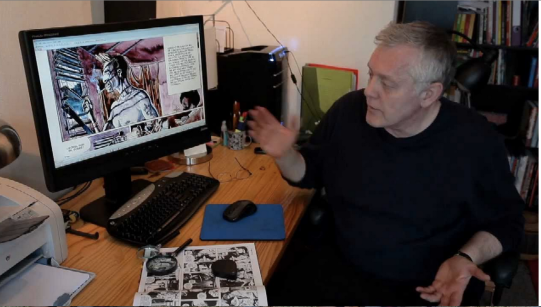Essays and critiques by Zoran Djukanovic (1955) have been translated into English, French, Dutch and Arabic and have been published in over forty newspapers, weeklies, comics magazines and magazines on culture and literature. He is known as one of the best experts of comics art in the Balkans, and he jokingly calls himself “the man who writes forewords,” since in recent years his introductions appear in many editions devoted to comics in Serbia and Croatia.
We have edited a selection of questions and answers from several recent interviews with Zoran Djukanovic.
You wrote about politics, literature, film, and yet four decades you emphasises comics as a primary area of your research and writing … Why?
I’m an obsessive consumer of literature, film, comics, and visual arts in general. I wrote essays on politics, literature, film and comics, but comics emerged from the very beginning as the ugly duckling in which I saw a swan and followed its development.
Do you think that comics as a medium is out of the shackles of the ghetto, either imposed or self-imposed, and whether it takes a well-deserved position among the other arts. What do you think is the actual position of comics today?
Yes, comics are out of the ghetto. But some comics suckers, by inertia, put them back into it… The argument is a Pulitzer Prize in 1992 to a graphic novel (“Maus”, by Art Spiegelman). The argument is that Vladimir Pistalo, a writer and the winner of the NIN Award, wrote the novella “Corto Maltese”, which has experienced a series of releases. The argument is Umberto Eco’s book “Apocalyptic and Integrated” from 1964… The arguments are all great critics and essayists who have devoted themselves to the study of this media.


Zoran Djukanovic and our editor Zika Tamburic at the comics festival MaFest in 2012, Makarska, Croatia
How do you balance your love for classic comics with alternative and subversive comics?
Love of classic comics to me was not compromised with the surge of comics with a completely different sensibility in the late seventies. A long time ago, before I was even learning the concept of postmodernism, I had, in itself, fully integrated the love of elite and mass culture. In my passionate mind it was only a matter of time before the sharp boundaries between the two worlds begin to crumble and in my head that had already been demolished in the seventies. The title of my book “Thomas Mann or Philip K. Dick” (1988) poetically expressed this paradigm.
What is for you the best comics in the world, i.e., to make it easier,or make things more difficult, if you need to take to a desert island only one comic, which would it be and why?
I do not like to answer or/or questions like: are you for or against Sigmund Freud; who do you like more – mom or dad, gulag or economic exploitation … Whenever you approach some comics again, you need a fresh start to be able to experience them as if you read them for the first time. It is the equivalent of falling in love and every dive into comics has to be ‘for the first time’, because it is in a new context. Part of this changing context is we ourselves. So, depending on at what point you ask me, I would have provided different answers. Nevertheless, I will try to offer at least a consolation prize, or prizes. I’d have brought the most beautiful love story narrated in a comic book, Craig Thompson’s “Habibi”. After an intensive and repeated close reading, I will need some time to pause in order to once again be able to take on a new meeting with this work. One of the comics that I was least bored with during long reading is “Lucky Luke” by Goscinny and Morris. The best graphic novels in the series “Ken Parker” by Berardi and Milazzo are comics equivalent of friendship, not going back to them constantly or too often, but I have confidence that when I get back, waiting for me will be warmth and humanity. “Sandman”, “Corto Maltese”, diptych “The Big Hoax” and “The Iguana” by Trillo and Mandrafina, the first five episodes of “Le vagabond des limbes” by Godard and Ribera, “Alien Justice” of the series “Nexus” by Baron and Rude, “Fires” by Mattotti, “Flash Gordon” by Barry in the period between 1951-1963…


Zoran Djukanovic at the Salon of Comics in 2013, Belgrade, Serbia
Can you live off your writing about comics? Which publishers are you collaborating with?
I have a ‘genius’ financial structure: I live in a rich country (the Netherlands) and publish my works mainly in countries in transition and in the cycle of crisis of capitalism and recession. Can I live from my writing? Of course not.
Do you think that the time for comics, as the ninth art, slowly going through and how do you feel about the increasing consumption of comics in an electronic form?
Visual narrative exists from the cave drawings and we, when we go back to the caves, are likely to continue with the visual storytelling. I read comics in equal shares as printed and digitally scanned. For a careful analysis is particularly useful to zoom in scans with a high resolution on the big screen…
It is like to worry about whether gossip, as a social-psychological phenomenon, is going to disappear. Do not worry, just look at Facebook.
